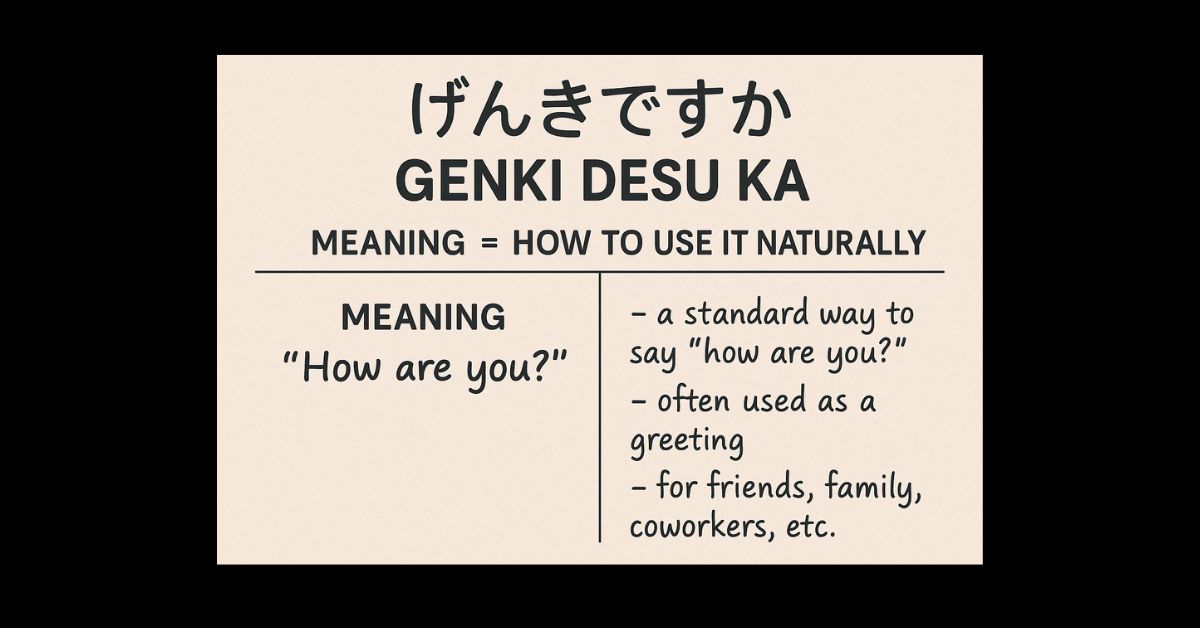“Genki desu ka” is a typical Japanese greeting that translates to “How are you?” in English. The meaning of genki desu ka is more than simply asking how your day is, it is an expression of worry and respect. In Japan, “o genki desu ka” is used in polite contexts, particularly when speaking seniors or teachers.
A natural reply would be “hai, genki desu,” which means “Yes, I’m well.” Unlike in English, Japanese greetings like genki desu ka are caring and sincere.It’s a great expression to learn if you’re starting your Japanese conversation journey.
What Does “Genki Desu Ka” Mean? The Complete Breakdown
“Genki desu ka” is a polite Japanese expression that translates to “Are you well?” or “How are you?” The genki desu ka meaning develops from grouping words that explain health, energy, and respect. It’s one of the first greetings learners learn in Japanese conversation.
- 元 (gen) – means “source” or “base”
- 気 (ki) – means “spirit,” “mood,” or “energy”
- 元気 (genki) – means “healthy,” “lively,” or “in good spirits”
- です (desu) – polite way to say “is/are” (used in many Japanese expressions)
- か (ka) – turns the sentence into a question
- お (o) – an honorific prefix that makes the expression more respectful
- Together: お元気ですか (o genki desu ka) = “Are you feeling well?” (polite)
This division allows you to recognize that genki desu ka is not simply a simple hello it’s an expression of honest worry in Japanese culture. Studying phrases such as this creates solid foundations within Japanese language and greetings.
The Cultural Significance
Greetings such as genki desu ka in Japan also have rich national importance. Opposing to English, in which “How are you? ” sounds mechanical, the genki desu ka meaning indicates genuine interest in a person’s health. It transfers values such as respect, agreement, and emotional closeness.
These concepts are attached to peace in Japanese, which be likely to be carried as “heiwa” (平和). With polite expressions such as o genki desu ka shows that you care and are aware of Japanese culture. Learning to say these greetings supports you in developing meaningful Japanese conversations with understanding and genuineness.
How to Respond to “Genki Desu Ka” – Formal vs. Casual
When someone says “Genki desu ka?”, there are a few natural ways you can reply, depending on how you’re feeling and the situation.
Formal Responses:
- はい、調子はいいです。
Hai, choushi wa ii desu.
Yes, I’m doing well. - 元気に過ごしています。
Genki ni sugoshiteimasu.
I’ve been doing well lately. - おかげさまで、順調です。
Okagesama de, junchou desu.
Thanks to you, everything is going easily. - 体調は良好です。
Taichou wa ryoukou desu.
My health is good. - 特に問題ありません。
Toku ni mondai arimasen.
No problems at all.
Casual Responses with Friends
- うん、元気だよ。
Un, genki da yo.
Yeah, I’m good! - まあまあかな。
Maa maa kana.
I’m okay, I guess. - ちょっと疲れてる。
Chotto tsukareteru.
I’m a little tired. - 元気じゃないかも。
Genki ja nai kamo.
Might not be feeling great. - いつも通りだよ。
Itsumo doori da yo.
Same as usual.
Natural Conversation Examples Using “Genki Desu Ka”
Let’s see how “genki desu ka” look like in real-life Japanese conversations:
Example 1: Meeting a Colleague
田中: 山田さん、最近お元気ですか?
Tanaka: Yamada-san, saikin o-genki desu ka?
Tanaka: Mr. Yamada, how have you been lately?
山田: はい、元気にしています。田中さんは?
Yamada: Hai, genki ni shiteimasu. Tanaka-san wa?
Yamada: Yes, I’ve been doing well. How about you, Mr. Tanaka?
田中: おかげさまで、私も元気です。
Tanaka: Okagesama de, watashi mo genki desu.
Tanaka: Thanks for asking, I’m doing well too.
Example 2: Casual Friends Meeting
アキラ: ユミ、元気にしてた?
Akira: Yumi, genki ni shiteta?
Akira: Hey Yumi, how’ve you been?
ユミ: うん、元気だよ!そっちは?
Yumi: Un, genki da yo! Sotchi wa?
Yumi: Yeah, I’m doing great! How about you?
Example 3: Asking About Someone Else
先生: 山本さんのお母様は、お元気ですか?
Sensei: Yamamoto-san no okaasama wa, o-genki desu ka?
Teacher: How has your mother been, Yamamoto?
山本: はい、とても元気にしています。よろしくお願いします。
Yamamoto: Hai, totemo genki ni shiteimasu. Arigatou gozaimasu.
Yamamoto: Yes, she’s doing very well. Thank you for asking
Want to explore Japan’s culture?
Learn the soul of Japan through its traditions, culture, and hidden secrets with our select guides. From history and food to insider travel tips, whatever you need, we’ve got it. And the best part? It’s all absolutely free!
Related Article: Eto Meaning Japanese: Mastering This Common Filler Word
Beyond “Genki Desu Ka”: Alternative Ways to Ask How Someone Is
Although genki desu ka is the most classic Japanese way of asking “How are you?” There are many other things you can say depending on what is happening. Knowing these makes you sound more natural and shows that you’re learning more than simple basics. The meaning of genki desu ka is polite and worried but sometimes there are better expressions to use in informal or friendly conversations.
Other Ways to Ask “How Are You?” in Japanese:
- 最近どうですか? (Saikin dou desu ka?) – How have you been lately?
- 調子はどう? (Choushi wa dou?) – How’s everything going?
- お変わりありませんか? (O-kawari arimasen ka?) – Any changes? (formal)
- 元気にしてる? (Genki ni shiteru?) – You doing well? (casual)
- 体調はどうですか? (Taichou wa dou desu ka?) – How’s your health?
These words are outstanding to include into regular Japanese conversation and make you sound more like a inborn. They also go beyond the simple genki desu ka greeting and provide a more natural, friendly feel to your language.
Cultural Tips for Using “Genki Desu Ka” Appropriately
Greetings in Japanese culture are not simply words but send respect, timing, and relationship. Though the genki desu ka meaning is understanding and polite, misusing it can sound unnatural. For a natural way with Japanese speech, it is helpful to know when and how to use genki desu ka correctly.
- First meeting vs. regular encounters:Don’t say genki desu ka when meeting someone for the first time, use “Hajimemashite” instead. Genki desu ka is better after some time apart.
- Consider the timing:If you just saw the person recently, asking genki desu ka might sound odd. It’s best used after a short gap in communication.
- Age and status matter:Use o-genki desu ka with elders, teachers, or anyone in a higher position. It shows politeness and respect in Japanese greetings.
- Regional variations:Some parts of Japan have their own ways of asking how someone is. While genki desu ka is common, don’t be shocked by local expressions in Kansai or Okinawa.
Mastering “Genki Desu Ka” – Tips for Language Learners
Working out how to say and reply to genki desu ka is an excellent way to style actual Japanese dialogue. To get the full sense of the meaning of genki desu ka, it’s useful to move outside of textbooks and employ actual practice.
- Practice with audio resources:Listening to natural speakers helps you hear the tone and flow of genki desu ka in everyday speech. Try Japanese podcasts, anime, or language apps.
- Role-play conversations:Act out short greetings with a partner or language exchange friend. It makes using genki desu ka and its replies feel more natural and fun.
- Pay attention to body language:In Japan, a well-mannered bow often goes along with expressions like o-genki desu ka. How you move matters just as much as what you say.
- Learn the kanji:Knowing the kanji for genki (元気) helps with reading and writing. It also connects you more deeply to Japanese culture and expressions.
When To Use “Genki Desu Ka” – Context Is Everything
The meaning of genki desu ka might appear straight forward, but applying it in the correct setting makes all the difference. Context is everything in Japanese communication a whole lot! Being able to know when to use genki desu ka makes you sound polite, natural, and culturally complex.
- When you haven’t seen someone in a while:Perfect for reconnecting with friends, colleagues, or teachers after some time apart.
- During phone calls or video chats: A polite and warm way to begin a conversation and check in on someone.
- When asking about someone’s health or condition:You can also use genki desu ka to check in on someone recovering from illness.
- In emails or letters to friends and colleagues: Especially in formal or semi-formal writing, it’s a respectful opener.
- At the start of a conversation with acquaintances: It’s a friendly way to comfort into a chat and show you care.
Ready to Take Your Japanese to the Next Level?
Mastering phrases such as genki desu ka is simply the tip of the iceberg when it comes to mastering the Japanese language. Used as a standard greeting, genki desu ka translates to “How are you?” and enables true human bonding. Understanding what genki desu ka means displays worry about the other’s well-being in a respectful manner culturally.
To be more natural-sounding, practice various greetings according to the situation. For example, in informal conversation you may simply use “Genki?” while in a formal context use “Ogenki desu ka.” Being aware of how Japanese people converse makes you feel at comfort whether speaking with a colleague, teacher, or friend.
Look up more Japanese hello, practice with audio resources, and pick up cultural tips such as how body language balances your words. Before long, you’ll be able to say expressions like genki desu ka second nature. Keep on practicing and your Japanese skills will develop quicker than you imagine!
Common Questions About “Genki Desu Ka”
Is it bad-mannered to ask “genki desu ka” to someone you just met?
Yes, it can feel too personal. Use “hajimemashite” or a polite greeting instead when meeting someone for the first time.
How often can I use “genki desu ka” with the same person?
Not too often only after a gap. Using it daily sounds boring or odd in everyday Japanese conversation.
What’s the most natural response to “genki desu ka”?
The normal reply is “Hai, genki desu,” which means “Yes, I’m well.” You can add “anata wa?” to ask back.
Is “genki desu ka” used in business settings?
In business, more formal phrases like “ikaga osugoshi desu ka” are preferred over casual genki desu ka.
Can I just say genki?
Yes, in casual chats with friends, simply replying with “Genki!” works. It feels light, natural, and friendly.
Does Genki mean healthy?
Yes, “genki” means healthy, lively, or active in Japanese. It’s often used to ask or say how someone feels.
Is Genki desu ka a way to ask how someone is doing?
Yes, it’s the most common way to ask “How are you?” in Japanese, especially among friends and connections.
Conclusion
In Japanese, “genki desu ka” is not only a word, it’s a bridge of culture that connects humans through respect and concern. Understanding the genki desu ka meaning supports beginners in starting a natural and respectful conversation. Official to informal use, proficiency in this greeting makes learners feel confident in spoken and social settings.
By learning polite answers, alternative expressions, and cultural background, you are more easy and culturally intelligent. Practice, observe, and continue to use these lines in everyday dialogue. Whether conversing with friends or colleagues, employing genki desu ka indicates friendliness and interest, two secrets to effective Japanese communication. Keep discovering, remain nosy!

